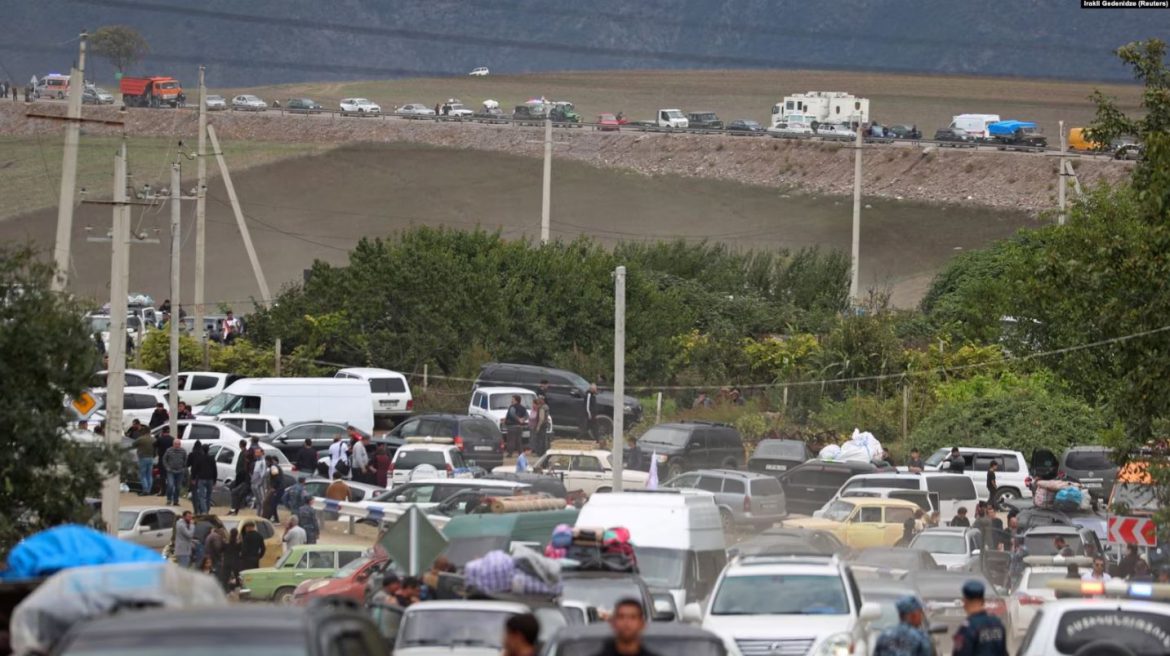The United States and the European Union pledged on Tuesday to provide urgent humanitarian aid to ethnic Armenian residents of Artsakh (Nagorno-Karabak) fleeing to Armenia in droves amid the ongoing restoration of Azerbaijani control over the region.
A steady stream of these refugees crossed the Armenian border for the third consecutive day in cars, trucks and buses that jammed the main road connecting Karabakh to Armenia. Their total number reached 28,000 as of 8 p.m. local time, according to the Armenian government.
The vast majority of an estimated 100,000 people remaining in Karabakh are expected to follow suit in the coming days and weeks. They too are unwilling to live under Azerbaijani rule as a result of last week’s Azerbaijani military offensive.
“We have been hungry for four days,” one of the refugees told RFE/RL’s Armenian Service in the Armenian border town of Goris. The visibly exhausted woman said she and her family members spent five days at a Russian military base in Karabakh before being evacuated to Armenia.
Some of the other refugees said they left behind children and other loved ones who went missing or were seriously wounded and hospitalized during the Azerbaijani assault that reportedly left dozens of Karabakh Armenian civilians dead.
All arriving refugees are redirected to a reception center set up by the government in Goris. Government officials and private charity activists working there offer them food, temporary housing and other urgent assistance.
Another Karabakh woman, who fled to Armenia together with her children on Monday, complained that they have still not been provided with any accommodation. “We are now going into the [Goris] municipality building to see where they are going to send us,” she said.
In Yerevan, Deputy Prime Minister Tigran Khachatrian reaffirmed the Armenian government’s pledge to accommodate all Karabakh refugees. In his words, 2,500 refugees have already been sent to their new homes in various parts of Armenia, while 1,200 others are in the process of receiving government-funded housing.
“The other people [who fled Artsakh] have said that they have somewhere to live and don’t need our assistance,” Khachatrian told a news conference.
Some refugees interviewed by RFE/RL’s Armenian Service said they have rejected government offers to settle in towns or villages close to Armenia’s volatile border with Azerbaijan. They said they do not want to fear for their safety anymore.
Samantha Power, the head of the U.S. Agency for International Development (USAID), witnessed the flow of refugees and spoke to some of the displaced Karabakh Armenians when she visited the Goris area adjacent to the Lachin corridor on Tuesday.
“The experiences these families have had are harrowing,” she told reporters there. “Many of them fled their villages under shelling and many who have arrived here, according to the doctors that we spoke to, are suffering from severe malnutrition.”
Power announced that the U.S. government will provide $11.5 million in humanitarian assistance to the refugees.
“This assistance will be used to provide everything from food to psychosocial support, given the psychological wounds that so many citizens are carrying,” she said, adding that it will also support “efforts to reunite families” from Karabakh.
“There are many unaccompanied children who have crossed into the Republic of Armenia and it is absolutely urgent that they be reunited with their families,” explained the U.S. official.
The European Union announced, for its part, a relief aid package worth 5 million euros ($5.1 million) for Karabakh’s civilian population. An EU statement said the sum will be spent on providing “cash assistance, shelter, food security and livelihoods assistance” to up to 25,000 refugees in Armenia. It said similar aid will be delivered through the International Committee of the Red Cross (ICRC) to around 60,000 Karabakh Armenian remaining in their homeland for now.
The ICRC is the only international humanitarian organization which is allowed by Azerbaijan to operate in Karabakh. Power said Baku must also give other aid agencies “full and unimpeded access to the Lachin corridor and into villages and towns of Nagorno-Karabakh.”
Source: Azatutyun.am




